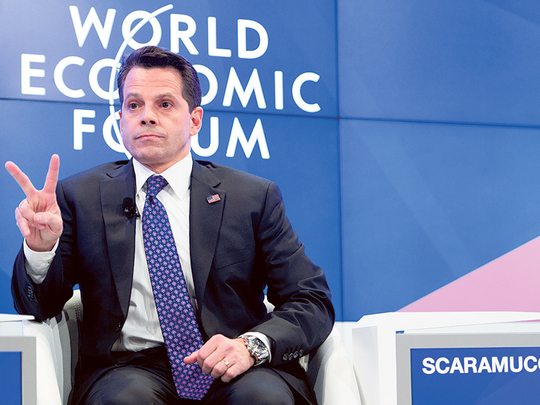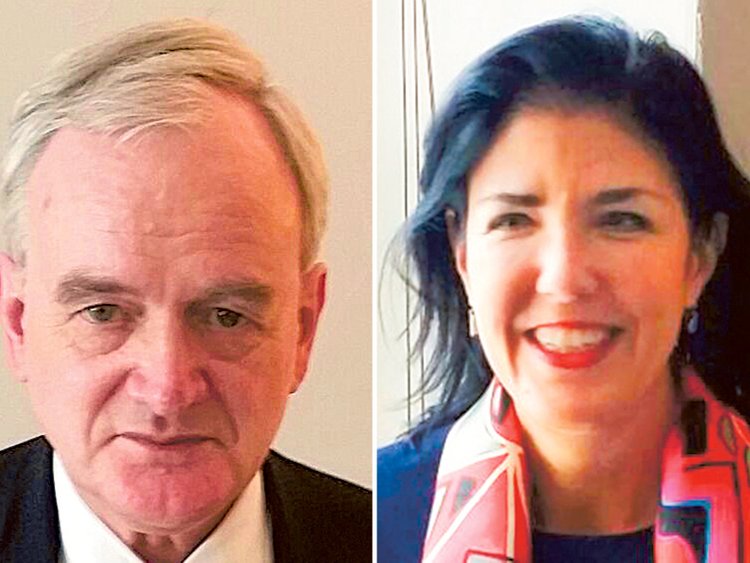
Davos: The business community is getting ready to welcome a Trump presidency that is likely to cut taxes, reduce regulation and invest substantially in infrastructure creating a wave of new business opportunities.
These were the reasons given in the annual PWC survey of global CEOs, which was released at Davos and shows the US jumping to the top country where CEOs expect growth, overtaking China and leaving many other emerging markets well behind.
In 2017, 43 per cent of CEOs put the US at the top of their growth list, compared to 33 per cent for China which was in second place. This contrasts sharply with the 39 per cent that China got in 2011, when the US only got 21 per cent.
Will a Trump presidency be good for businesses? Global CEOs seem to think so. Gulf News Editor at Large Francis Matthew is at the World Economic Forum in Davos to tell us more.
However, the next day Willem Buiter, Chief Economist at Citibank, agreed with that prognosis and said “the Trump cabinet is full of people who have worked in the global world. Goldman Sachs is global and so is ExxonMobil. Deregulation is positive for business, as would be easier repatriation of profits.”
But he added a characteristic note of caution that this good news for business may only last for the first two years of Trump’s presidency: “The US does not need a stimulus at present. It is currently close to full employment, so the impact of the spending on infrastructure and tax reform will create overheating of the economy and inflation will start to rise by 2019.
“In addition the deficit will go up, and the Fed may be forced to act, if Trump has not packed it with his people. Historically a Republican congress has not liked the deficit, to if the White House has a poor relationship with Congress there may be a crisis.”
Anthony Scaramucci, who from Friday will head up the White House Office for Public Liaison, told a session at Davos that Trump’s presidency was committed to global trade and increasing prosperity, and portraying him as a narrow nationalist could not be further from the truth.
“Trump could be one of the last great hopes for globalisation,” he said. By regenerating America’s dying middle class, Trump could paradoxically end up saving globalisation: “If you can create rising wages in the US, you can create more purchasing power. And that virtuous circle of consumption will lead to global trade, and it will lead to more global peace, and more global prosperity,” Scaramucci argues.
During his campaign, Trump accused China of currency manipulation and protectionism leading many people to worry that US-Chinese relations will turn very frosty. Scaramucci dismissed these fears, saying “China and the US have a common cause, and we have to have a strong bilateral relationship. We don’t want to have a trade war. We want a process of free and fair trade.”
But Scaramucci (and therefore the Trump Administration’s) definition of free trade has yet to be agreed with China. Scaramucci said that American trade relations with countries like China have been “asymmetrical” as the US has allowed goods and services to flow freely which has not been reciprocal. “All we’re asking for now is to create more symmetry in these trade agreements,” said Scaramucci.
This kind of confusion over delicate political or economic negotiations were at the top of mind for Tina Fordham, Chief Global Political Analyst as Citibank, when she defined Trump’s Twitter account as her top political risk for 2017. “He bypasses the media and there is no vetting. His direct communication with the public makes it very difficult to anticipate what will happen, and creates uncertainty in policy. This means a lot of noise will be coming out of the White House in which conviction will matter more than logic, like when Trump called the European Union a ‘German project’ which created all sorts of confusion across the EU.”
Tareq Sultan, CEO of Kuwait-based Agility, the logistics giant present in more than 100 countries, said that “China needs the US and cooperation between the two is a must. It is a win-win for the US and for China”.
He saw Trump’s rhetoric on China as a “negotiating skirmish” as the incoming president seeks to set a new paradigm for a relationship between the two countries. “He is a capable businessman,” said Sultan. “He can see the logic of numbers and growth as well as anyone.”
Trump’s appointment are very strong business candidates, and his selections will be beneficial to business. For example he has picked Daniel Yergin to advise on energy and oil and there is no better thinker on the topic.
But Sultan also shared Fordham’s worries over Twitter. “I hope that Trump’s Twitter account does not diminish his focus on the heavy lifting that is required as he removes restrictions and makes it more flexible for business”.












